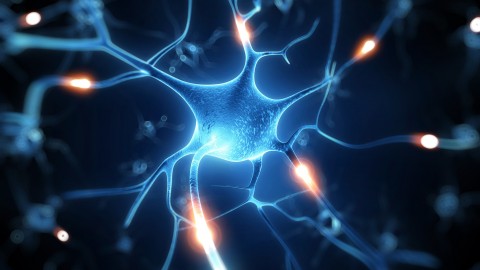The adenoids are glands that sit behind the nose above the roof of the mouth. When they grow large, they can cause snoring and breathing problems. They are part of the immune system.
These glands help trap germs that enter the nose or the mouth, in an effort to prevent infections.
The size of the adenoids increases until a child is 6 years old, then they slowly shrink. The adenoids usually disappear by the time a person is 16. Enlarged adenoids are rare in adults.
Structure And Functions
Adenoids glands are the pair of patch tissues present behind the uvula on the upper part of naso-pharynx. The upper surface of adenoids has a thin layer of ciliated epithelial cells covered by a thin film of mucus. The cilia are the microscopic hair-like projections from epithelial cells that move constantly in a wave like manner to propel the mucus secreted from the mucus layer downward to pharynx. The adenoids have protective action against the infection. When you breathe you take lots of bacteria virus, various dusts and foreign bodies with the air. Those are trapped in the epithelial mucus membrane of adenoids and the cilia present in the epithelial tissues throw them out towards the pharynx to swallow Causes.
Most of the time, the adenoids become enlarged when the body is trying to fight off infection. They can remain enlarged, even after the infection is gone.
Some children have enlarged adenoids from birth. Allergies can also cause this enlargement.
Although it is rare, adults’ adenoids can become enlarged, due to a chronic infection or allergy, pollution, or smoking. Even less common is enlarged adenoids resulting from a cancerous tumor.
Symptoms
- snoring
- pauses in breathing during sleep
- strained or noisy breathing
- restless sleep
- breathing more through the mouth than the nose
- bad breath or dry, cracked lips resulting from mouth breathing
- difficulty swallowing nasal-sounding speaking voice
- a persistent runny nose
- frequent ear infections
- frequent colds
- swollen glands in the neck
- sleeping in an unusual position, with the head back and the knees to the chest while the person is lying on their front
Risk Factors
Risk factors for enlarged adenoids include:
- frequent infections in the head, throat, or ears
- tonsil infections
- having enlarged tonsils
- complications
A child with enlarged adenoids can experience the following complications:
Otitis media with effusion, or glue ear, a middle-ear infection with chronic fluid buildup that can lead to hearing problems sleep apnea, which causes pauses in breathing while sleeping, as well as snoring problems breathing through the nose, which leads to excessive mouth-breathing.
Homoeopathic Treatment
Baryta Carb: Baryta Carb is one of the most effective Homeopathic medicines for enlarged adenoids. It works wonders in adenoids cases where the child is very prone to catch cold easily. Every exposure to cold causes adenoids to enlarge. Including adenoids the tonsils, too, may also be enlarged in such cases. Throat pains, difficulties in swallowing, blocked nose, breathing by opening mouth with dryness of mouth are well marked. The child is mentally as well as physically weak. A child has a tendency of increased sweat from feet that are offensive in nature.
Agraphis nutans: Agraphis is one of the key remedies for adenoids first introduced by Dr.Cooper. The characteristic symptom of nasal obstruction, especially from enlarged adenoids and throat deafness I have frequently seen relieved by this remedy. The action of this remedy is felt towards the root of the nose. it is one of the leading remedies in case of adenoids. The child is very susceptible to catching a cold. Every cold affects the adenoids and tonsils and causes obstruction of the nose.
Bacillinum: It is the nosode usually given as intercurrent remedy on the basis of totality symptoms. The key symptom is the person frequently catch cold and that affect the adenoids and tonsils. He is very susceptible to cold. The child has a good appetite and eats well but has a very lean and thin body constitution. Family history of bronchial asthma or allergic rhinitis or tuberculosis may be present. There is very frequently changing of symptoms. There is a tendency of chronic headache that origin by study or slight mental exertion.
Calcarea carb: Calcarea Carb is the most effective Homeopathic medicine for enlarged adenoids. The child is fatty, obese, tendency to put weight. There is a tendency to sweat more on slight physical exertion, especially from the head portion. Desire for open air, cannot tolerate warm atmosphere, and sweat profusely, but exposure to cold air makes him suffer cold and cough with blocking nose and adenoids. Difficult and delayed dentition with the characteristic head sweats.
Natrum Mur: It is mainly prescribed for those children who are lean and thin, emaciated with enlarged adenoids. Those children are generally prone to get frequent upper respiratory infection with marked sneezing, fluent, thin watery nasal discharges. The child has a good appetite but still not gaining weight in proportional to his diet. Child has a tendency of headache if exposed to sun or by continuous reading. The natrum mur child is cranky and stubborn in nature.
Opium: It is mainly prescribed for those children who are lean and thin, emaciated with enlarged adenoids Its key symptom is snoring. When the child sleeps due to blockage of the nose there is intense snoring.. This is attended with rattling and Sertorius breathing. The child may also have brief pauses in breathing during sleep. The other symptoms are of excessive drowsiness and sleep during the day.
Tags: Adenoids And Homoeopathy










